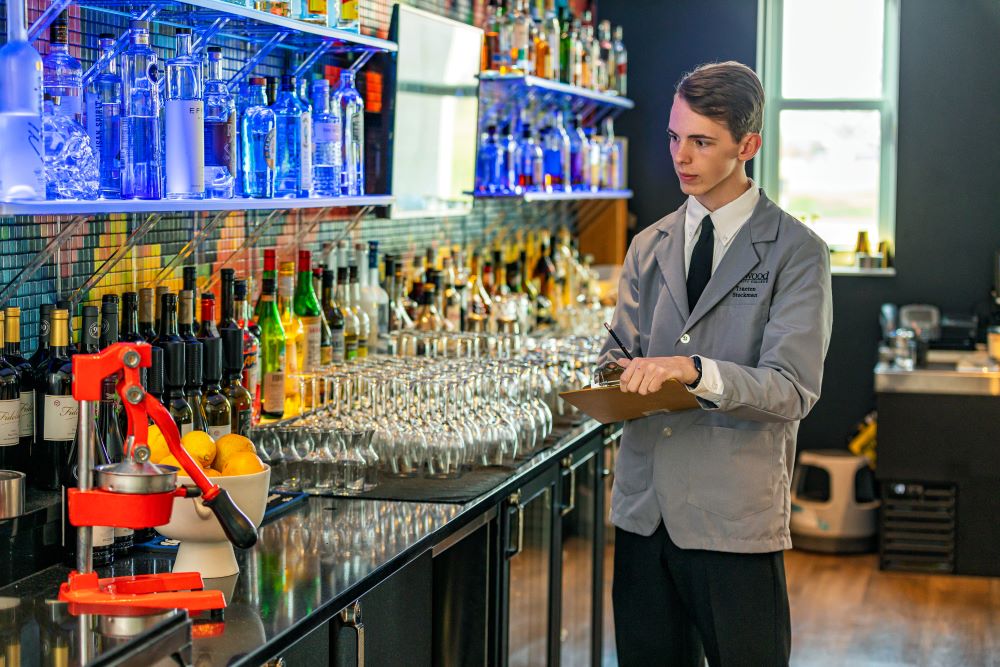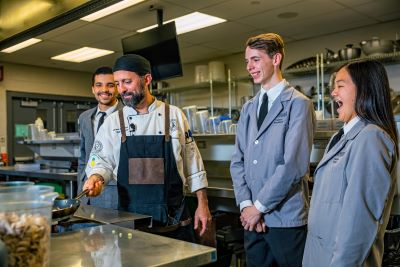On a recent trip to snowy Cedar Rapids, Iowa, for Meetings Today’s annual team meeting, I hopped off the shuttle bus from Eastern Iowa Airport and rolled my suitcase over the salt-covered porte cochere driveway leading to the main entrance of The Hotel at Kirkwood Center.
One of Iowa’s first AAA Four-Diamond hotels—of which there are seven across the state—The Hotel at Kirkwood Center is the “only luxury teaching hotel of its kind in the nation.” The property serves as a learning laboratory for the 350-plus students in Kirkwood Community College’s Hospitality Arts program, which offers programs in hospitality management and culinary arts as well as a baking and pastry arts certificate.
The Meetings Today team gathered for dinner our first night in town just off the hotel’s main lobby at The Class Act Restaurant, a real-time teaching environment for Kirkwood Community College’s Culinary Arts program. Two servers greeted us with menus at our table, the younger of the two in a black jacket, and the older one wearing gray.
If I hadn’t been told prior to dinner that students at the hotel could be identified by their gray jackets, I wouldn’t have been able to differentiate between the student and the professional. I may have even assumed the nontraditional student was the teacher, as she took care of us like she’d been waiting tables for years.
Skills like hers are a direct result of the hands-on learning experience students receive at The Hotel at Kirkwood Center, where they work daily alongside experienced professionals in learning situations to deliver high-value hospitality.
“The Hotel at Kirkwood exists for the purpose of training students in hospitality,” said David Horsfield, hospitality arts department chair at Kirkwood Community College. “It’s part of the campus, part of the community college. Kirkwood doesn’t need to run a hotel. It’s not in the hotel business, but it has built this space with the vision to be able to give students a chance to be hands-on and practical.”
[Related: The Z: Guiding Gen Z From the Classroom Into Meetings Industry Careers]

About the Program
Kirkwood Community College and The Hotel at Kirkwood Center offer two associate of applied science (AAS) degrees that students can complete within two years, as well as a 10-week Baking and Pastry Arts Certificate program through the college’s Department of Hospitality Arts.
“The community college model is, ‘If you want to come, you’re welcome,’” Horsfield said. “There [are] no barriers. The cost compared to a four-year school or private space is significantly lower, so it’s designed to remove the barrier of entry cost. If you want to come, you’re welcome in this space.

“We promote this and have informational events ahead of time to help people understand this isn’t a ‘sit at a desk for two hours in a classroom taking notes’ kind of experience,” Horsfield continued. “There’s time spent in the classroom, but there’s lots of time spent actually doing [the work].”
The Hospitality Management program prepares students for entry-level careers in different sectors of service such as tourism, hotel operations, F&B management, event planning, sales and marketing, guest relations and more. Students in the program experience and help manage the day-to-day operations of a luxe lodging facility. Coursework exposes them to the various departments of hotel operations, from front office management and hotels sales to housekeeping management and F&B.
“The language we would use would be ‘front of house’ and ‘back of house,’” Horsfield said. “So, the Hospitality Management students are interested less about food and more about the front-of-house service experience.”
The Hospitality Management program is designed to reflect the dynamic hospitality industry, which according to the program’s description, has seen an increase in the demand for individuals with a combined college education and practical work experience in various entry-level positions. It opens doors to career opportunities that include front office managers, sales managers, executive housekeepers, convention services managers, meetings and events planners, and more.
Some of Kirkwood Community College’s Hospitality Management program classes include:
- Introduction to Lodging Operations
- Service Techniques
- Hospitality Accounting
- Hospitality Personnel Management
- Leadership in Hospitality
The second AAS program offered is Culinary Arts, in which students receive culinary training for foodservice professionals in a real-world setting, The Class Act Restaurant. They assist in the daily operation of the restaurant while getting hands-on training in management, food preparation and service from highly experienced faculty and operational managers.
“The back-of-house people are all about the food,” Horsfield said, often achieving career roles such as executive chefs, banquet chefs, restaurant chefs, catering managers, business owners and more.
Classes offered to students in Kirkwood’s Culinary Arts program include:
- Kitchen Essentials
- Food Fundamentals
- Culinary Techniques
- Bakery Basics
- Menu Planning
[Related: The Z: Industry Organizations and Associations Offering Student Memberships]

Behind the Scenes
Outside of the classroom, the time students spend “actually doing the work” takes place just next door to The Center for Hospitality Arts within The Hotel at Kirkwood Center.
Upon checking into The Hotel at Kirkwood Center, any average guest likely wouldn’t be able to tell that much of the hotel’s operations—including check-in—are often handled by students. While the hotel itself is run by a team of professionals, from the general manager and director of F&B to the restaurant manager and director of sales, students are integrated into every operations space of the hotel as part of their learning experience.
“They have mentors the whole time,” Horsfield said. “The leadership team in the hotel has a teaching requirement built into their job descriptions, and that’s actually an attraction to hiring. People are like, ‘Well, I’ve done the industry, but I really want to try something that’s a little different,’ and this gives them that diversity of experience.”

They are the teachers in a real-world classroom. At any given moment, working in the front office to the left of the hotel’s main doors can turn into a student’s next assignment. The bar tucked into the back right corner of the lobby may be hidden behind students sitting on each barstool, rotating behind the bar while learning how to make nonalcoholic cocktails.
On a walking tour of The Center for Hospitality Arts, which connects to the hotel through doors just off the main lobby, Horsfield first stopped in front of one of the college’s baking labs. Through the windows, I could see at least a dozen students in chefs toques and coats, working together to bake something that smelled so delicious it made my mouth water as a student opened the bakery doors.
“This is a group of culinary students in the two-year degree program taking a bakery lab course,” Horsfield said. “When students are in a lab space, it’s for five days a week, four hours a day. This bakery class will meet from 12-4 p.m., Monday through Friday, for four weeks.
“So, chef’s done a demonstration of the finished product,” he continued. “Then, the students are in there for four hours and have plenty of time to go around and learn how to make it themselves.”
He pointed out a few employees wearing black hats toward the back of the bakery lab and identified them as the operational team for the hotel, which makes the cakes, pies, pastries and other sweet treats that go out to the hotel and its business operations. Working alongside the students, they share “super expensive equipment,” Horsfield said, such as the massive ovens lining the bakery’s walls.
We then made our way down the hall to a second lab space, in which more culinary students were working hard to recreate what the chef made at the start of their class. This group, Horsfield explained, were in the first year of the Culinary Arts program.
[Related: The Z: How to Attract and Hire Gen Z Employees in the Events Industry]
“In year one, they’re in this controlled environment as a culinary student,” Horsfield said, motioning toward the laboratory in front of us. “In year two, after they’ve had a year of training, then they get integrated into the hotel outlets. So, anybody that’s providing the service or creating the food alongside the professional team has had at least a full year of training before they go and do that.”

In contrast, those in the Hospitality Management program hit the ground running during their first semester, working in different line-level positions for the year before taking on a summer internship and returning to The Hotel at Kirkwood Center for their second year, during which they take on bigger roles like supervising the front desk or joining the hotel’s sales team.
“We call it ‘clinical experience,’” Horsfield said.
Kirkwood Community College also helps students in the Hospitality Management and Culinary Arts programs find internships through partnerships the college has with different businesses locally, nationally and internationally, sending some students to places as far away as Italy, Singapore and Japan.
We then made our way to the final stop of the tour, a lecture hall-style space with a working kitchen in which students practice banquet training and celebrate their graduation by preparing a meal in front of a live audience of about 100 people (who then eat it). Students plan their own menu in class, sell tickets to the public and put on a four-hour dinner show twice a year.
“The really cool thing is one of the very first classes students take is in this room,” Horsfield said. “We say, ‘Stay the distance. Keep coming. When life gets hard and your education goals seem to go away, stay the distance, because at the end, you’ll be on stage here.’
“We’ve got a beautiful facility to do our thing,” he added.
At the end of our tour, Horsfield waved to two people down the hallway, the hotel’s executive chef, James Vido, and Banquet Chef Marcela Billmeyer.
“Both graduates of Culinary Arts at Kirkwood,” Horsfield said with a smile.
To learn more about Kirkwood Community College and The Hotel at Kirkwood Center’s student programs and opportunities, visit www.kirkwood.edu/hospitality.
Logging out with love,
Taylor
Have a question about Gen Z or a topic you’d like to learn more about? Share your thoughts with Taylor at taylor.smith@meetingstoday.com, on Instagram at @tay__writes or on X at @taywrites.
Mission Statement: "The Z: Planning for the Industry’s Next Generation" is a Meetings Today column discussing the meetings and events industry’s newest and youngest members—the incoming Generation Z. Written by Meetings Today’s Taylor Smith, a member of Gen Z herself, The Z explores how to welcome, work with, understand and plan for the industry’s next wave of professionals while serving as a guide for members of Gen Z themselves, planners and attendees alike.
Read more from "The Z: Planning for the Industry’s Next Generation."







